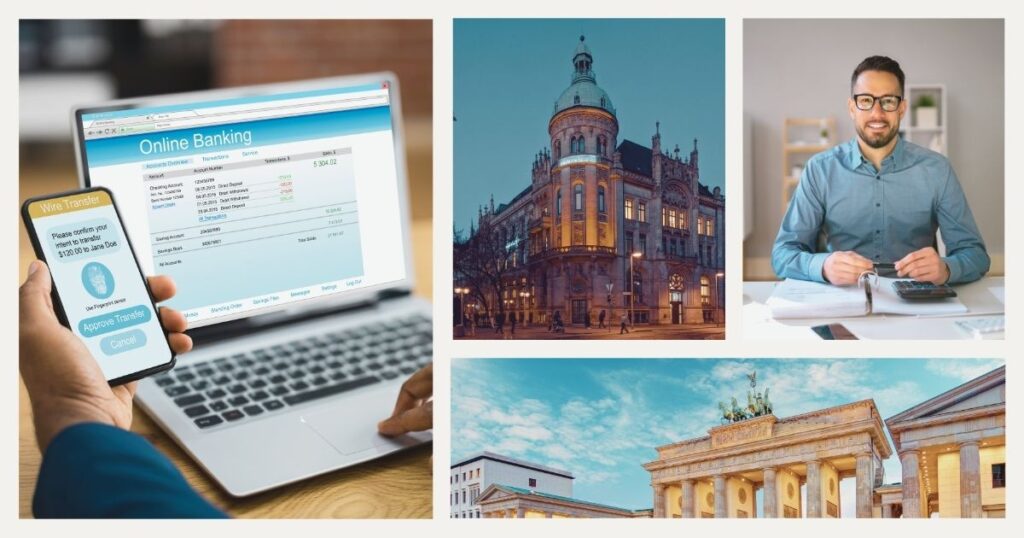Managing your finances efficiently becomes a crucial priority when establishing yourself in Europe’s largest economy. For digital nomads, entrepreneurs, and international professionals, knowing how to open a bank account in Germany represents an essential step toward financial stability and administrative compliance in your new environment.
Germany’s robust banking system offers excellent security, sophisticated online banking options, and integration with the wider European financial network. However, navigating the process as a non-resident comes with unique challenges—from documentation requirements to language barriers and understanding the different account types available.
This comprehensive guide will walk you through everything you need to know about how to open a bank account in Germany, covering traditional and digital options, required documents, and practical considerations for your financial transition.
Understanding the German banking system

Before diving into the application process, gaining a basic understanding of how German banking works will help you make informed decisions about which institution best meets your needs.
Types of banks in Germany
Germany features several distinct categories of banking institutions, each with its own advantages. The three primary types include:
Traditional banks (Großbanken) like Deutsche Bank and Commerzbank offer comprehensive services and extensive branch networks. However, they typically charge higher fees when you open a bank account in Germany as a foreigner.
Savings banks (Sparkassen) operate regionally with strong community connections and competitive fees. These institutions often provide excellent service for local residents but may have limited English support.
Cooperative banks (Volksbanken and Raiffeisenbanken) function similarly to savings banks but are member-owned and often feature favorable terms for account holders.
Digital vs. traditional banking options
The rise of online-only banks has revolutionized the process of opening a bank account in Germany, particularly for digital nomads and international professionals.
💡 Did you know? Germany hosts Europe’s most vibrant neobank ecosystem, with over 15 digital-only banks currently operating in the country. These institutions processed more than €85 billion in transactions in 2024 alone.
Digital banks like N26, Revolut, and Vivid Money typically offer free basic accounts, simplified application processes, and excellent English-language support. Their mobile-first approach allows you to open a bank account in Germany entirely through your smartphone, often without requiring a German address.
Traditional banks provide advantages like in-person customer service, broader product offerings (including loans and investments), and sometimes greater perceived security.
Essential requirements to open a bank account in Germany

Regardless of which banking path you choose, certain requirements apply when you open a bank account in Germany. Understanding these prerequisites helps ensure a smooth application process.
Documentation necessities
The specific documents required to open a bank account in Germany vary between institutions, but most banks request:
- Passport or national ID card (for EU citizens)
- Proof of address (Anmeldung or rental contract)
- Residence permit or visa (for non-EU citizens)
- Proof of income or employment (sometimes required)
- German tax ID number (Steueridentifikationsnummer) for some accounts
Traditional banks typically enforce stricter documentation requirements than their digital counterparts. Some neobanks allow you to open a bank account in Germany with just your passport and a European address.
🌟 Pro tip: before starting your application, contact your chosen bank to confirm exactly which documents they require. This simple step can save considerable time, especially since requirements can vary between different branches of the same bank.
Address registration (anmeldung) considerations
One significant challenge when you want to open a bank account in Germany is the circular dependency between banking and registration. Many traditional banks require an Anmeldung (official address registration) to open an account, but you often need a bank account to secure housing.
Several strategies can help navigate this challenge:
- Use a digital bank that doesn’t require Anmeldung for initial account opening
- Ask your employer if they can provide assistance with the bank account process
- Consider temporary solutions like Wise for immediate financial needs
- Check if your landlord can help with the registration process
Step-by-step process to open a bank account in Germany

Following a methodical approach when you open a bank account in Germany helps ensure nothing is overlooked.
Researching and selecting the right bank
Begin by evaluating your specific banking needs and preferences. Consider factors like:
- Fee structures (monthly account maintenance, ATM withdrawals, international transfers)
- English-language support availability
- Physical branch accessibility if in-person service is important
- Mobile banking capabilities and user experience
- Special programs for expats or international clients
Take time to compare offerings from multiple institutions before deciding where to open a bank account in Germany.
Application process walkthrough
The actual process to open a bank account in Germany follows different paths depending on your choice:
For traditional banks:
- Schedule an appointment (often possible online)
- Prepare all required documents in advance
- Attend an in-person meeting with a bank representative
- Complete application forms (often available in English)
- Verify your identity (usually done in-branch)
- Receive account details and access credentials by mail within 1-2 weeks
For digital banks:
- Download the bank’s mobile application
- Begin the registration process
- Scan your identification documents
- Complete video verification of your identity
- Receive immediate access to your digital account
- Physical card typically arrives within 1-2 weeks
Maintaining reliable connectivity during the digital application process is essential. A dependable eSIM from Holafly ensures stable internet access throughout the verification steps, preventing frustrating interruptions when submitting documents or completing video identification. Their Germany-specific data plans provide immediate connectivity upon arrival, making the entire process of opening a bank account in Germany much smoother.
🌟 Pro tip: when completing video verification, ensure you’re in a well-lit environment with minimal background noise. Have all your documents readily accessible and be prepared to answer basic questions about your purpose for opening the account.
Banking options for different nomad situations

Your specific circumstances influence which approach makes the most sense when you open a bank account in Germany.
Solutions for short-term stays
If you’ll be in Germany for less than six months, the full process to open a bank account in Germany might not be necessary. Consider these alternatives:
- International digital banks like Revolut or N26 that operate across Europe
- Multi-currency accounts through services like Wise or Payoneer
- Using your existing bank account with international withdrawal capabilities
- Prepaid debit cards that can be loaded with euros
These options provide financial functionality without the commitment of a full German bank account.
Long-term resident banking needs
For longer stays or permanent relocation, investing time to properly open a bank account in Germany delivers significant advantages:
Key considerations for long-term banking in Germany:
- Establish a credit history for future financial needs
- Access specialized products like savings accounts with preferential rates
- Benefit from SEPA direct debits for recurring payments
- Potentially qualify for loans, mortgages, and investment products
- Integrate fully with the German financial system for tax purposes
- Avoid foreign transaction fees on daily purchases
- Utilize standing orders (Dauerauftrag) for regular payments
- Access German-specific payment methods like Girocard
🌟 Pro tip: even if you initially open an account with a digital bank for convenience, consider establishing a relationship with a traditional German bank once you’re settled. This dual-banking approach gives you flexibility while providing access to the full range of financial services.
Common challenges and how to overcome them

Various obstacles can complicate the process of opening a bank account in Germany. Understanding these challenges in advance helps you navigate them effectively.
Language barriers and solutions
Despite Germany’s international business environment, banking remains an area where English support varies significantly. Strategies to manage language challenges include:
- Research banks with dedicated English-speaking staff
- Bring a German-speaking friend to appointments if possible
- Request forms in English in advance (many banks offer this option)
- Use digital banks with fully English interfaces and support
Most importantly, don’t let language concerns prevent you from finding the best banking option. Many banks have significantly improved their English support in recent years.
Navigating banking fees and fine print
German banks typically operate with various fees that might surprise those from countries with different banking models. When you open a bank account in Germany, carefully review the fee structure for:
- Monthly account maintenance fees
- ATM withdrawal charges, particularly for non-network ATMs
- Foreign transaction fees
- Minimum deposit or regular income requirements
Request a complete fee schedule before finalizing your account opening.
Final thoughts on opening a bank account in Germany
Successfully navigating the process of opening a bank account in Germany represents an important milestone in establishing your financial foundation as a digital nomad or expat. The German banking system, while initially complex, offers exceptional security, reliability, and functionality.
Remember that banking needs often evolve during your time in Germany. The account that perfectly suits your initial arrival may not be ideal as you become more established. Remain flexible and willing to reevaluate your banking arrangements as your circumstances change.
Nomada understands the unique challenges digital nomads face when establishing financial services abroad. The banking system represents just one aspect of successfully navigating life and work as a location-independent professional in Germany.
For more insights on establishing your digital nomad lifestyle in Germany, explore our comprehensive guide to Germany’s digital nomad visa and discover the perfect balance of work and exploration in this dynamic European hub.
Your financial foundation in Germany begins with the right banking partnership. Simplify your nomadic journey with informed financial choices 👉
Stay connected while you travel with Holafly’s eSIM 🌍
Getting ready for a trip and want to forget about roaming charges, physical SIM cards, or unreliable public WiFi? With Holafly’s eSIM, staying online in over 160 countries is easier than ever.
With Holafly, you’ll enjoy:
📲 Instant activation: just scan a QR code and you’ll have data at your destination.
🌐 Global coverage: available in 160+ countries, including top tourist spots and major business hubs.
📅 Flexible plans: choose daily, weekly, or monthly options based on your travel needs.
❌ No physical SIM required: keep your current SIM in place, no local procedures needed.
💬 Multilingual support: get fast, clear assistance whenever you need it.
Browse securely without relying on public networks, access maps, apps, bookings, and work remotely without interruptions.
Set it up once and easily pause or switch profiles as needed, saving battery and managing your data usage.
📵 Say goodbye to roaming fees and hello to a simple, secure connection—without surprises on your bill.
Does your phone support eSIM? Then Holafly is the perfect travel companion to stay connected wherever you go.
Frequently asked questions about opening a bank account in Germany
Yes, though with limitations. Digital banks like N26 and Revolut allow non-residents to open accounts with just a passport and a European mailing address. Traditional banks typically require proof of German residence through the Anmeldung registration process.
Digital bank accounts can be opened in as little as 15 minutes if your identity verification goes smoothly. Traditional bank accounts usually take 1-2 weeks from application to receiving your card and access credentials.
No, though it can be helpful. Many banks in major cities offer English-speaking services, particularly those catering to international clients. Digital banks typically provide full English support through their apps.
At minimum, you’ll need a valid passport or national ID (for EU citizens). Most banks also require proof of address, while traditional institutions often ask for residence permits (for non-EU citizens).
Some digital banks allow account opening from abroad, but most traditional banks require in-person verification. Certain banks offer pre-registration online with final verification completed upon arrival.




